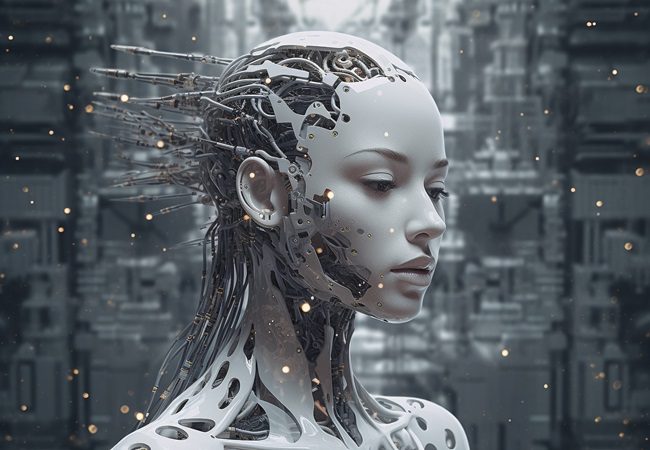Introduction:
In the ever-evolving landscape of technology, two groundbreaking fields are on a collision course to redefine the boundaries of what’s possible – Quantum Computing and Artificial Intelligence (AI). This article delves into the fascinating realm where quantum mechanics meets machine learning, exploring the symbiotic relationship between quantum computing and AI, and the unprecedented possibilities that arise from this fusion.
Understanding Quantum Computing:
Before delving into the synergy between quantum computing and AI, it’s crucial to grasp the fundamentals of quantum computing. Unlike classical computers that use bits, quantum computers leverage qubits. These qubits can exist in multiple states simultaneously, thanks to the principles of superposition and entanglement, enabling quantum computers to perform complex computations at speeds unimaginable by classical computers.
Superposition and Entanglement:
Superposition allows qubits to exist in multiple states at once, exponentially increasing computing power. Entanglement, on the other hand, links qubits in a way that the state of one qubit directly influences the state of another, regardless of the distance between them. This interconnectedness is a fundamental aspect of quantum computing.
Quantum Computing’s Impact on Artificial Intelligence:
Quantum computing has the potential to revolutionize the field of artificial intelligence in several ways, overcoming the limitations of classical computing and unlocking new horizons for machine learning and optimization problems.
Enhanced Processing Speed:
Quantum computers have the ability to process vast amounts of data simultaneously, thanks to superposition. This means that AI algorithms, particularly those involving complex calculations or pattern recognition, can achieve results much faster than classical computers. Tasks that were once deemed impractical due to computational intensity may soon become routine with quantum computing.
Solving Complex Optimization Problems:
Optimization problems, which are inherent in many AI applications, can be extremely challenging for classical computers. Quantum computing excels in solving these problems efficiently. For instance, in machine learning, quantum algorithms can optimize large sets of variables simultaneously, providing solutions to complex optimization challenges more rapidly than classical algorithms.
Quantum Machine Learning:
The convergence of quantum computing and machine learning gives rise to a new field known as quantum machine learning. Quantum algorithms designed for machine learning tasks could outperform classical counterparts, particularly in areas like clustering, classification, and regression. This could lead to more accurate predictions and insights in various industries, from finance to healthcare.
Challenges and Opportunities in Quantum-AI Integration:
While the potential of combining quantum computing and AI is immense, it comes with its set of challenges and uncertainties that must be addressed to fully unlock the synergies between these two transformative technologies.
Quantum Decoherence and Error Correction:
Quantum computers are highly susceptible to errors due to a phenomenon called quantum decoherence. Maintaining the integrity of quantum states over extended periods is a significant challenge. Developing effective error-correction mechanisms is crucial to harnessing the full potential of quantum computing in AI applications.
Quantum Hardware Development:
Building scalable and stable quantum hardware is a significant hurdle. Quantum computers are highly sensitive to environmental factors, requiring extremely low temperatures and controlled conditions. Advancements in quantum hardware are essential for making quantum computing more accessible for widespread AI applications.
Algorithm Development for Quantum Computers:
Designing algorithms specifically tailored for quantum computers is a complex task. Quantum algorithms need to be developed and optimized to exploit the unique capabilities of quantum systems effectively. This requires interdisciplinary collaboration between quantum physicists, computer scientists, and AI researchers.
Real-World Applications: Quantum-AI Impact:
Despite the challenges, there are promising real-world applications where the fusion of quantum computing and AI can usher in transformative changes.
Drug Discovery and Molecular Simulation
The pharmaceutical industry stands to benefit significantly from the synergy between quantum computing and AI. Quantum computers can simulate molecular structures with unprecedented accuracy, accelerating drug discovery processes. AI algorithms can then analyze this data to identify potential drug candidates more efficiently.
Supply Chain Optimization:
Quantum computing’s prowess in solving complex optimization problems finds applications in supply chain management. AI algorithms can leverage quantum computing to optimize routes, streamline logistics, and enhance overall supply chain efficiency, leading to cost savings and reduced environmental impact.
Financial Modeling and Portfolio Optimization:
In the financial sector, quantum computing can revolutionize risk assessment, portfolio optimization, and fraud detection. AI algorithms, powered by quantum computing, can process vast amounts of financial data at unprecedented speeds, enabling more accurate predictions and decision-making.
The Road Ahead:
Collaborative Innovation:
The synergy between quantum computing and AI represents a transformative leap forward, but the journey is far from over. Realizing the full potential of this fusion requires collaborative innovation across scientific disciplines, industries, and research communities.
Interdisciplinary Collaboration:
Quantum-AI integration demands collaboration between quantum physicists, computer scientists, and AI researchers. Bringing together experts from these diverse fields fosters a deeper understanding of the challenges and opportunities, accelerating the development of quantum algorithms optimized for AI applications.
Global Research Initiatives:
Governments, private organizations, and academic institutions worldwide are investing in research initiatives to propel the development of quantum computing and AI. International collaboration is essential for pooling resources, sharing insights, and overcoming the collective challenges associated with these cutting-edge technologies.
Ethical Considerations and Responsible Innovation:
As quantum computing and AI progress, it is crucial to address ethical considerations. Responsible innovation involves ensuring that the benefits of these technologies are accessible to all and that potential risks, such as algorithmic bias, are mitigated. Establishing ethical guidelines for quantum-AI integration is vital for shaping a positive and inclusive future.
Conclusion:
The fusion of quantum computing and artificial intelligence represents a quantum leap in the realm of technological possibilities. From solving complex optimization problems to advancing drug discovery and enhancing financial modeling, the impact of this synergy is profound. As we navigate the challenges and opportunities on the road ahead, collaborative innovation, interdisciplinary cooperation, and ethical considerations will play pivotal roles in shaping the transformative future of quantum-AI integration. The journey is intricate, but the potential rewards are nothing short of revolutionary.

































